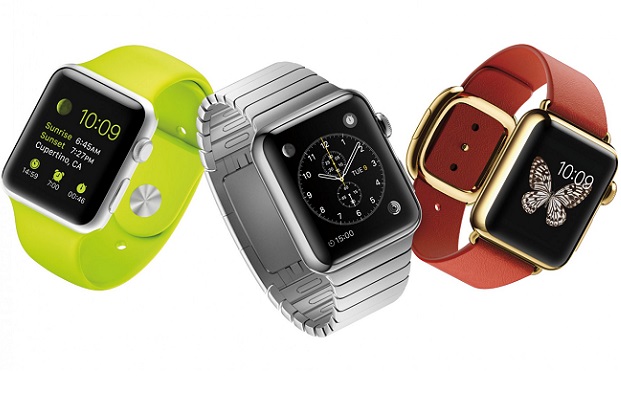Apple’s much anticipated smartwatch will launch today, but can the trend-setting tech giant do for wearables what it did for smartphones and tablets?
The company announced its plans for Apple Watch last year, marking its first new product type since the iPad in 2010.
Apple said that entry price would be $349 in the United States, and that two different sizes would be available in three collections, including the Apple Watch Edition, featuring 18-carat gold cases in yellow or rose, sapphire crystal and finely crafted bands and closures.
The Apple device will connect with the iPhone, and also have a range of apps and sensors, notably for health and fitness.
The watch is also expected to include map software that guides people to destinations with gentle taps on the wrist.
Fitness apps on the Apple Watch and its rivals could spell trouble for makers of fitness bands from companies like Jawbone, Fitbit and Nike.
[poll id=”5″]
Analysts at Forrester believe 20 million people in America alone are “inclined to buy something new from Apple” and that this gives the company “an easy shot at converting 10 million people to buy Apple Watch between the US and international markets.”
More than 1m people could pay well over $1,000 for the Watch, marking Apple’s transition into a mass-market luxury brand, timed perfectly to coincide with the increasing homogenisation of smartphones.
Companies get sneak peek
Companies including Facebook and BMW have been given secret early access to the Apple Watch in order to test their new apps before launch, according to reports
Staff from BMW, Facebook and United have spent several weeks at Apple’s California headquarters polishing new apps which will be released on the platform when the Watch is officially launched on Monday, according to Bloomberg.
But measures to protect secrecy around the hardware are strong and strict: according to reports the companies are sharing rooms inside Apple’s Cupertino campus, no outside materials are allowed to be brought in – not even a pen and paper – and there is no internet access.
Source code for their apps is brought in on hard disks which cannot be taken away from the campus. Apple will send the code back to companies at a closer to launch, the source claimed.
Research by Accenture revealed that 12 per cent of people intend to buy a smart watch within a year, rising to 41 per cent who plan to do so within five years.
Analysis- brand support crucial to success
John Newbold, Co-founder at 383, commented on what he thinks the Apple Watch means for brands: “Today’s event is make or break for the smartwatch; if Apple can’t sell the category, no-one can,” Newbold said. “However, it’s odds on that the launch of the Apple Watch will prove to be a watershed moment for the smartwatch – public awareness of the devices will rocket, the size and value of the market will double (at least), and brands will start seeing our wrists as a key new battleground for attention.
“The interesting thing about the Apple Watch, from our point of view, is that brands are going to be crucial to its success. While Apple has been focused on making its watch fashionable and functional, it’s brands that are going to make it truly useful. Customers don’t want brands to constantly bombard them with advertising – but if a brand can deliver a truly useful experience, especially one that stops people from having to reach for their phones, then the Apple Watch may well prove to be the perfect new device that no one knew they needed,” Newbold concluded.

